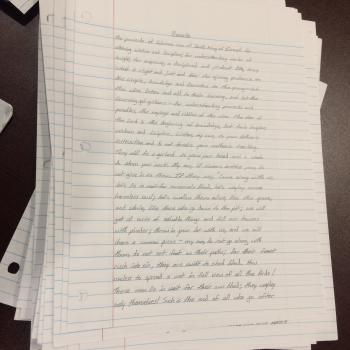 Welcome to Holy Writ! What’s Holy Writ? Simply put, this blog is my journey with you to personally copy the Bible by hand.
Welcome to Holy Writ! What’s Holy Writ? Simply put, this blog is my journey with you to personally copy the Bible by hand.
From the time the New Testament was completed approximately 1,900 years ago, devoted scribes copied the New Testament manuscripts by hand, generation after generation, until the invention of Guttenberg’s printing press in the 1400s.
Still today, over 5,800 copies or portions exist in Greek, over 10,000 in Latin, and over 1,000 in other ancient languages (not including quotations in other ancient works).
While the need for people to copy the Bible by hand no longer remains, the sacred tradition of meditating upon Scripture through writing down each word has been lost.
My goal for 2011 is to copy all 260 chapters (all 7,957 verses in the NIV), at least one chapter each weekday, with pencil on paper, as an experiment in resurrecting this ancient spiritual discipline.
Why? I’ve always been intrigued by the idea of scribes copying the Bible, perhaps because my job as a Christian author and editor resembles the work of ancient scribes, from Ezra in the Jewish Scriptures, to Luke, John, Paul, Peter, Mark, and others in the New Testament. One of the most popular books of all time became my recent inspiration, The Imitation of Christ, by Thomas a Kempis. He was German monk in the 1300s who copied manuscripts, including the Bible at least four times. His writing reflects a depth of understanding of the ancient biblical text I desire to imitate.
Above is a picture from my Blackberry from the opening words of Matthew’s Gospel. The first 18 verses are some of the most difficult, as they include the family history of Jesus and several Hebrew names perplexing to spell. Plus, I had an opportunity to reflect on Matthew’s version of the Christmas story again, reminded once again of the myriad factors involved to bring together wise men from the east, leaders of the Roman Empire, and Jewish rulers that forced Jesus and his family to Africa for some of his childhood.
Perhaps the most intriguing aspect of this process is noticing what is mentioned that modern readers often do not observe. I look forward to sharing the journey together. If you feel inclined to join the process, please do, and let me know so we can encourage one another in the process.
+++
Dillon Burroughs has written, co-written, or edited over 60 books, including the upcoming devotional work Thirst No More (October 2011). He served as an associate editor for The Apologetics Study Bible for Students and is a graduate of Dallas Theological Seminary. Find out more at DillonBurroughs.org.












